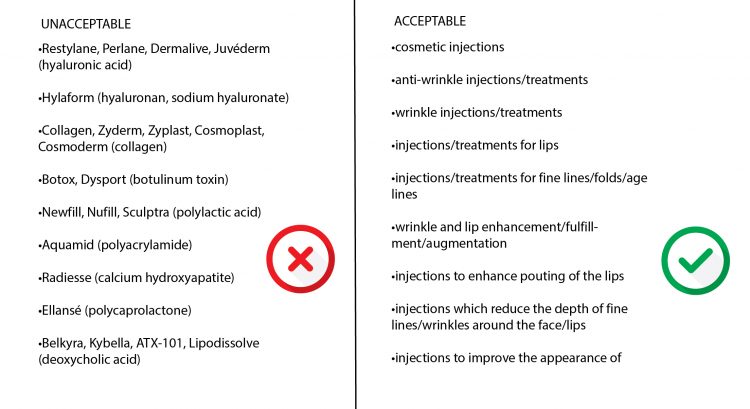The Therapeutic Goods Administration has published directions for health and aesthetics professionals, regarding acceptable language to use when advertising Schedule 4 prescription substances.
It is a reminder that it’s illegal for cosmetic clinics to broadcast certain therapeutic goods to the general public using their designated ‘prescription-only’ name.
Even if referring to the same chemical compound, terminology such as “anti-wrinkle injections” is acceptable, while using the pharmaceutical name, botulinum toxin, is not.
In other words, aesthetics and health professionals can continue promoting these service to consumers but they must follow the FDA’s acceptable language code, detailed below.

“Words and phrases with similar meaning may be used in advertising, provided that they do not refer to specific products or ingredient names,” say the guidelines.
“It is not acceptable to use acronyms, nicknames or abbreviations of the medicine’s name, which may be taken by a consumer to be a ‘reference’ to a specific medicine or substance.”
Advertising terminology restrictions for therapeutic goods are in place to protect the health and safety of consumers. Prescription medicines are considered high risk products and prior assessment of the patient by a medical professional is required before use.
Breaches of the legislation attract a maximum penalty of $10,800 for an individual and $54,000 for a body corporate.
The Cosmetic Physicians College Of Australasia, who represent a body of Australian cosmetic doctors advocate safety and ethical practices across the board.
Speaking for their members, (who perform non-or minimally invasive cosmetic medical treatments) the CPCA claim to be the whistleblowers, calling the TGA to clarify the guidelines.
“The CPCA has brought to the attention of the TGA a growing number of instances where prescription only medicines are being advertised to the general public in contravention of the law,” says Dr Catherine Porter, spokesperson for the organization.
“Furthermore, some of these advertisements contain ‘time limited’ offers which are also illegal.”




